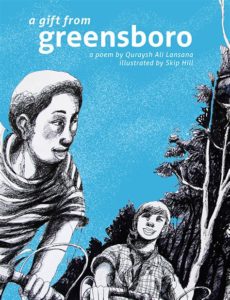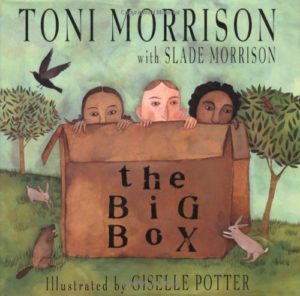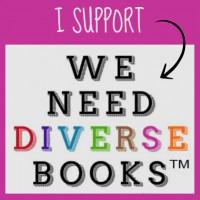 This month’s Industry Insider interview has double the goodness and double the fun, thanks to the generosity of Alexis Orgera and Chad Reynolds, the co-founders of Penny Candy Books.
This month’s Industry Insider interview has double the goodness and double the fun, thanks to the generosity of Alexis Orgera and Chad Reynolds, the co-founders of Penny Candy Books.
Alexis describes herself as a partner, friend, daughter, sister, animal lover, road-tripper, homebody, poet, essayist, children’s book publisher, and an editor/editorial consultant. She also spends a great deal of time “thinking about justice, imagination, and how to use what we have in our hearts and heads to make the world a little bit better.”
Alexis has also authored two fine poetry collections: How Like Foreign Objects and Dust Jacket, which won the 2013 Elizabeth P. Braddock Prize for Poetry.
Chad is the author of five poetry chapbooks and a co-founder of Short Order Poems, a poetry collaborative whose mission is to bring poetry to people in unexpected ways and places. He also [apparently] enjoys brief bios. 🙂
RVC: What is the most important thing people should know or understand about Penny Candy Books?
AO: First and foremost, it’s important to know that we focus on diversity. Our mission is to publish children’s literature that reflects the diverse realities of the world we live in, both at home and abroad. This means seeking out books by and about people and subjects that speak to and from a broad range of human experience.
We’re serious about our mission, serious about who’s telling the stories we choose to publish, serious about making books that aren’t exclusionary based on the traditional (old) paradigms. We hope to build a diverse company—authors, illustrators, readers, editors, designers, and more.
RVC: I think that most writers get excited when they hear publishers talking about alternative structures. So much of publishing seems locked into a pre-1980s mentality, despite the world changing dramatically in many ways.
CR: We’re new to publishing in this capacity, so I think by default we bring our other experiences as teachers, insurance brokers, store clerks, waiters, baristas, etc, with us to this endeavor, and that helps us see things in a fresh way. We’ve had a steep learning curve, and we’ve been keen to flatten it by learning best practices—but we always pause to ask whether a best practice makes sense or if it’s “best” because it’s what’s always been done.
We want to make it as a publisher and part of that involves doing some tried and true things, such as working with royalty contracts and using a traditional distributor. But we want to make it in our own way. Alexis and I both live outside the usual publishing hubs, and this gives us new insights and perspectives. We’re willing to take chances on newer or first-time authors and illustrators. We have an open submission policy and we don’t limit word or page counts.
RVC: You launched the Penelope Editions imprint in January 2017. In what ways are its books different than other Penny Candy Books titles?
AO: We launched Penelope to publish books that we loved that didn’t necessarily fit into Penny Candy’s model. We are currently honing Penelope’s mission, but it will have feminist leanings with books that display guts, vision, and humor.
RVC: I can’t help but note that the two of you are poets. Rumor has it that graduate school—and a shared love for poetry—brought you both together professionally. In what way(s) does having a background in poetry prepare you for publishing picture books which, on the surface, seem a good deal different than the work of Billy Collins, Sylvia Plath, W.H. Auden, and Rita Dove.
AO: Poets think a lot about concision of language, the alchemy that imbues words with meaning, and images. We were basically being groomed for kids’ books back in grad school without even realizing it. Going into this business, Chad and I both had strong feelings about the books that shaped us. Those books that really reach in and grab something inside you—they’re essentially poems.
Poetry and kid lit are similar, too, in that they both seek the universal, the experience we can all point to and say, “Hey, I totally get that!”
CR: Poetry and picture books have a lot in common, which maybe explains why poets as diverse as TS Eliot, Gwendolyn Brooks, Randall Jarrell, Naomi Shihab Nye, Ted Hughes, Maya Angelou, Gertrude Stein, Carl Sandburg, Langston Hughes, and many others wrote them.
RVC: Are there any poets of the type one might encounter in graduate school or, say, The Iowa Review, who haven’t yet entered the realm of writing picture books that you think might be well-suited to do so?
AO: Oh yes, and we have a few upcoming!
 RVC: If they’re anything like A Gift from Greensboro, a poem by Quraysh Ali Lansana that became one of the first Penny Candy Books title, you’re right to be excited.
RVC: If they’re anything like A Gift from Greensboro, a poem by Quraysh Ali Lansana that became one of the first Penny Candy Books title, you’re right to be excited.
Speaking of books that excite readers… prior to starting up Penny Candy Books, what picture books were wowing you? Which ones made you want to get involved in this industry?
CR: When I was a kid, my favorites were Small Pig by Arnold Lobel and A Visit to William Blake’s Inn by Nancy Willard. Pezzettino and Swimmy by the great Italian artist Leo Lionni were favorites of my kids and opened my eyes to narrative and visual possibilities in this genre. Books by Taro Gomi such as Everyone Poops and My Friends made us laugh while inviting us into global conversations. Ruth Krauss’s A Hole Is to Dig and Open House for Butterflies—both with spot illustrations by Maurice Sendak—showed me how well kids can respond to figurative language and leaps of imagination, and how to see the world through a child’s eyes.
But for all the great books we admired before starting Penny Candy Books, we also recognized that American kids’ books could at times feel one-sided, stagnant, Puritanical, pedantic. A lot of stories that needed to be told, weren’t being told.
 AO: Of all the books I loved as a kid, I don’t think any featured characters of color, except one that I now recognize to have been very racist and colonialist. I had a real love affair growing up with a series of tiny books by Jenny Partridge about the adventures of animals in Oakapple Wood. To name just a few, more recently, Toni & Slade Morrison’s The Big Box really made an impact on me and reminded me what a picture book can do in its exploration of concepts like freedom. Jacqueline Woodson’s This is the Rope, among many of her books, is another that I loved for its treatment of family history through the lens of the Great Migration. The poet Ted Kooser and Jon Klassen collaborated on House Held Up by Trees, which was a very lovely book.
AO: Of all the books I loved as a kid, I don’t think any featured characters of color, except one that I now recognize to have been very racist and colonialist. I had a real love affair growing up with a series of tiny books by Jenny Partridge about the adventures of animals in Oakapple Wood. To name just a few, more recently, Toni & Slade Morrison’s The Big Box really made an impact on me and reminded me what a picture book can do in its exploration of concepts like freedom. Jacqueline Woodson’s This is the Rope, among many of her books, is another that I loved for its treatment of family history through the lens of the Great Migration. The poet Ted Kooser and Jon Klassen collaborated on House Held Up by Trees, which was a very lovely book.
Finally, as we were planning what our books would look and feel like, we pored over books from all over the world to get a feel for the physicality of design. We were inspired by several French books, particularly.
RVC: I keep finding your press listed high up on the Dealmakers list of Publisher’s Marketplace. How many books do you plan to publish per year? And seeing that your authors include writers from Palestine, Australia, and France, some might wonder—is there a conscious ratio in mind of American vs. non-American authors?
CR: We are working up to publishing around 20 new titles per year, and we hope to hit that number within 4 or 5 years.
AO: Not a conscious ratio, no, but certainly an eye toward bringing work from other countries into the US kids’ book market. As a culture, particularly right now, we can’t afford to be isolationist in our reading habits. If kids are reading the works of authors from around the world, they’ll grow up with a broader perspective of what the world actually is. It’s not just our slice of it.
RVC: Now that you’ve been at it for a few years, what are some of the PB world trends you’re noticing?
AO: Diversity is a very important and necessary development. Hopefully it’s not a trend but a reality that’s here to stay. The “Own voices” movement is a critical aspect of diversity, and publishers are finally recognizing that who is telling the story is just as important as the story being told.
RVC: Describe the ideal Penny Candy Books author.
CR: The only ideals we have are that stories ring true and that authors use language in a way that makes these stories sing.
RVC: Last thoughts?
AO: Here’s to big conversations!
CR: Thanks for your interest, Ryan.
RVC: Thanks so much, Alexis and Chad!


